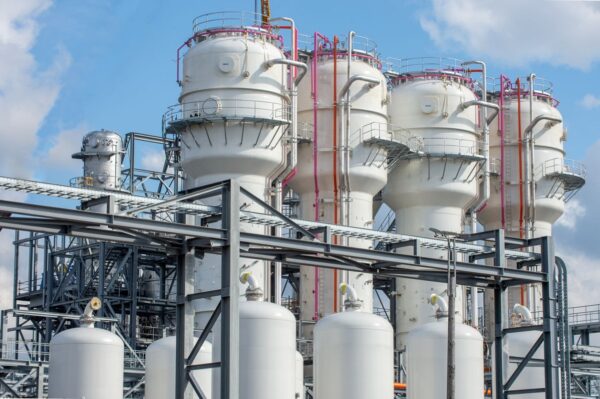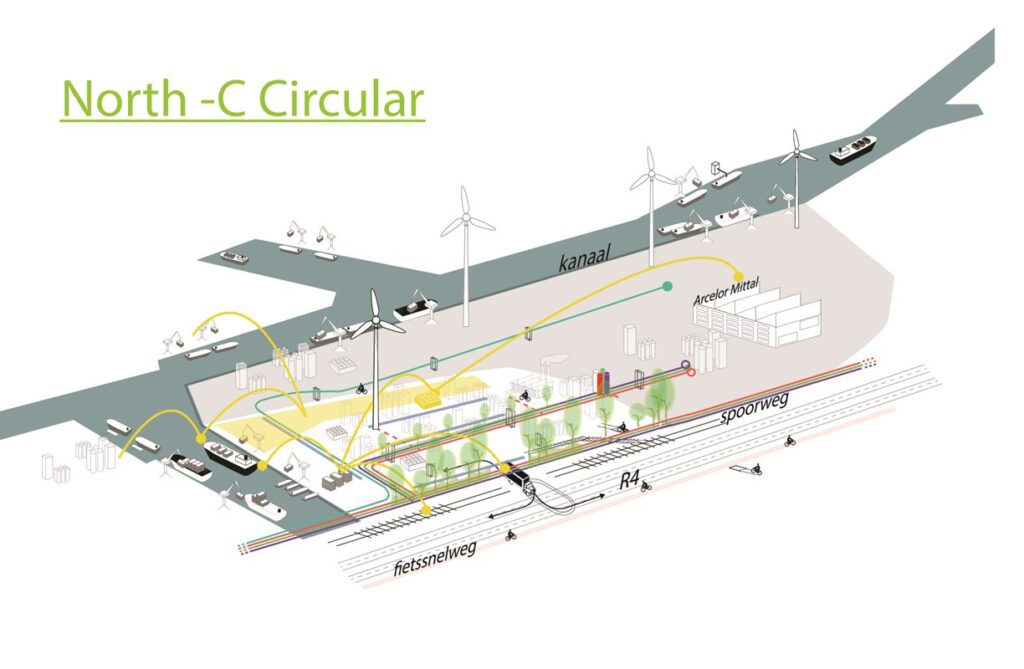ArcelorMittal Gent inaugurated its carbon capture and utilisation (CCU) plant on Thursday 8 December. This €200 million plant is the first of its kind in the European steel industry and one of the projects to reduce CO2 emissions at the Gent plant and in North Sea Port.
The Steelanol project is a first for the European steel industry. It involves a €200 million carbon capture and utilisation (CCU) plant. This plant uses carbon recycling technology and biocatalysts to convert carbon-rich waste gases from the steelmaking process and from waste biomass into ethanol. The ethanol can then be used as a building block to produce chemical products including fuel for transportation, paints, plastics, clothing and even cosmetic perfume. The advanced ethanol will be jointly marketed by ArcelorMittal and LanzaTech under the brand name Carbalyst®.
Once production reaches full capacity, the Steelanol plant will produce 80 million litres of advanced ethanol. That is almost half of the total current demand for advanced ethanol for blending fuels in Belgium. Annual carbon emissions from the Ghent plant will be reduced by 125,000 tonnes.
Climate-neutral and circular port
The steelanol project is fully in line with North Sea Port’s ambition to halve its CO2 emissions by 2030 and become a climate-neutral port by 2050. Moreover, converting gas from blast furnaces into bioethanol – waste becomes raw material – is an example of circular economy that the port will continue to work on in the coming years.
The accessibility of ArcelorMittal for large seagoing vessels is therefore of great importance. During the inauguration, Flemish Minister-President Jan Jambon and Flemish Minister for Mobility and Public Works Lydia Peeters confirmed that the New Lock in Terneuzen will be ready in 2023 and that Capesize ships will be able to sail up to ArcelorMittal.
The inauguration of the Steelanol plant in Ghent took place in the presence of Executive Chairman of ArcelorMittal Lakshmi Mittal, Belgian Prime Minister Alexander De Croo, Flemish Prime Minister Jan Jambon, members of the Belgian and Flemish governments, Vice-President of the European Investment Bank Kris Peeters, and Geert Van Poelvoorde, CEO of ArcelorMittal Europe.

Lakshmi Mittal, Executive Chairman of ArcelorMittal said, “ArcelorMittal Gent is widely regarded as one of the best steel plants in Europe, with talented, dedicated and forward-thinking people. We want to perpetuate that reputation in the future and I believe the work being done here lays the foundation for what the steelworks of the future will look like. This is a steel mill that uses the latest innovative technologies; that uses sources of circular carbon; that captures and reuses and recycles as much waste product as possible into something valuable; and that prepares for a future where green hydrogen makes the use of fossil carbon obsolete. It is a strong example of what is possible with energy, effort and, of course, brilliant scientific minds. It also shows what can be achieved through cooperation, so I would like to thank the Belgian and Flemish governments and the European Investment Bank for supporting our efforts to switch to carbon-neutral steel production.”
Alexander De Croo, Prime Minister of Belgium, said at the event, “I am delighted that ArcelorMittal is taking bold and innovative steps to decarbonise steel production at the new facility in Gent. This is an important step in the fight against climate change, while securing our future competitiveness and Belgian jobs. By investing in clean energy technologies, ArcelorMittal is not only helping to reduce carbon emissions but also setting the standard for the industry. The only way forward is cleaner production that leads to better products.”
Jan Jambon, Minister-President of the Flemish Government and Flemish Minister of Foreign Affairs, Culture, Digitalisation and Facility Management: “Maintaining and strengthening heavy industry in Europe is crucial for economic growth and strategic autonomy. ArcelorMittal’s high ambitions for sustainability and circularity fit within the Flemish government’s climate goals: a carbon-neutral and circular society by 2050, while maintaining industrial and economic activities in our region.”

